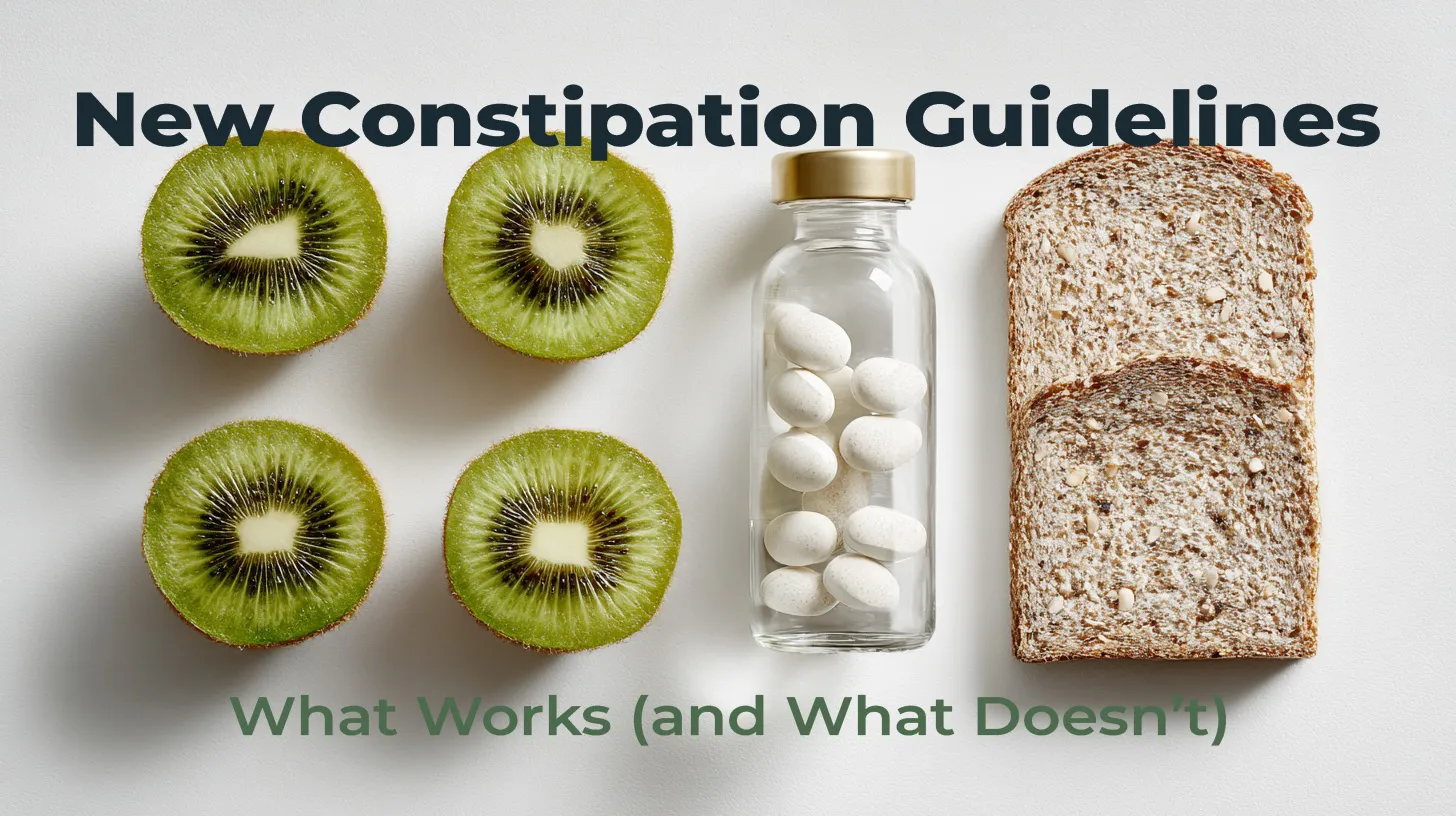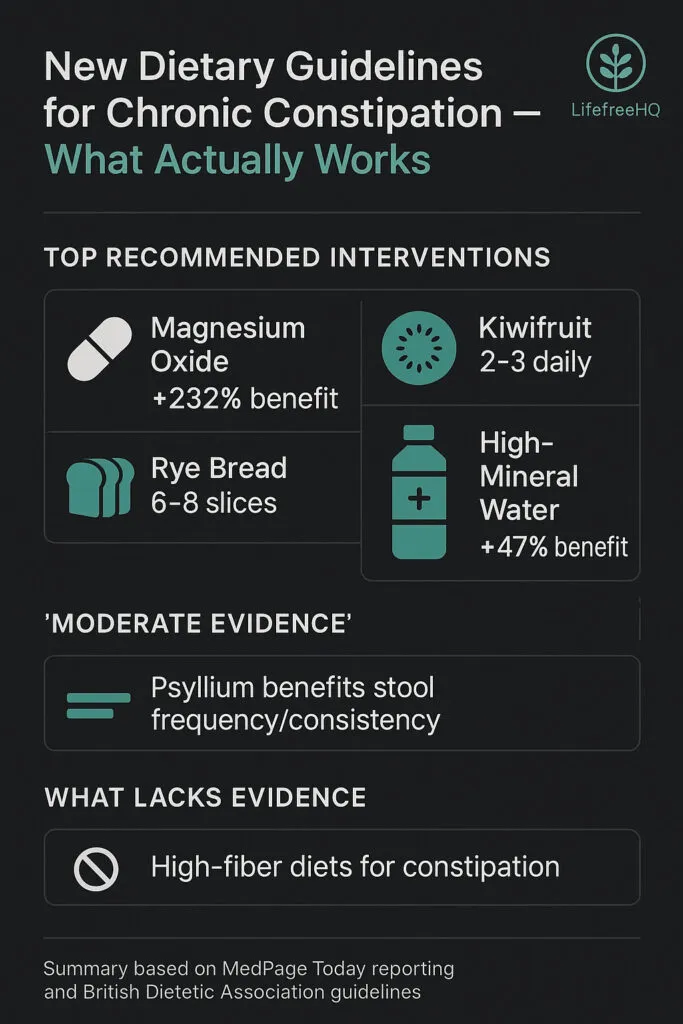Editor’s Note: The article originates from MedPage Today, a reputable medical news platform. The constipation guidelines outline evidence-based dietary strategies for chronic constipation, recommending kiwi, rye bread, and magnesium oxide supplements to help improve symptoms. The following section provides a summary of the article for LTHQ readers before we share our analysis and include a guide about magnesium glycinate for constipation treatment.
Summary of the MedPage Today Article
The British Dietetic Association released 59 evidence-based dietary recommendations that identify specific foods and supplements that help manage chronic constipation symptoms.
Research conducted across 75 randomized controlled trials revealed the following results:
- The evidence suggests that magnesium oxide is the most effective treatment when patients take 0.5–1.5 grams daily for at least four weeks, as it enhances clinical outcomes by 232% compared to control groups.
- The consumption of two to three kiwifruits daily produced better results for stool frequency than psyllium consumption.
- Daily consumption of six to eight slices of rye bread produced better results than white bread for increasing bowel movements during the week.
- Drinking water with high mineral content showed a small positive effect on treatment outcomes.
- The evidence suggests that psyllium supplementation yields improved clinical outcomes in various studies.
- Probiotics showed benefits for general symptoms, but researchers could not determine which specific strains work best.
The panel members failed to endorse high-fiber diets for constipation treatment because they lacked sufficient evidence from randomized trials. The majority of statements received low to very low research quality ratings because better-designed studies remain necessary.
The constipation guidelines support personalized treatment approaches that focus on specific symptoms, including stool frequency and consistency, as well as the severity of straining.
🌿 LTHQ Take
Research shows that targeted single-ingredient supplements deliver better results than broad generalized advice.
Several essential points need to be emphasized in this discussion.
- Magnesium stands as a proven effective treatment for constipation symptoms.
The article discusses magnesium oxide, but magnesium glycinate offers better tolerance for extended use because it has a gentler effect on the body. The enzyme actinidin in kiwis aids in digestion and regulates bowel movements without causing stomach cramps. - The research demonstrates that kiwifruit and rye bread offer unexpected yet scientifically proven health benefits.
The enzyme actinidin, present in kiwis, helps with digestion and regulates bowel movements. Rye bread provides a distinct fiber profile and fermentation pattern compared to wheat, which may explain the difference in stool frequency. - High-fiber diets maintain their health benefits, yet they do not effectively treat constipation symptoms.
The distinction between these two concepts stands as a vital point to understand. Fiber supports overall gut health, but it doesn’t always fix chronic constipation — especially slow-transit constipation. - Specific treatment approaches deliver superior results to general approaches.
Your specific symptoms require individualized treatment. The number of bowel movements per day, the shape of your stool, the need to push during bowel movements, and the amount of discomfort after bowel movements. Different dietary additions yield varying health benefits for various individuals.
What This Means for People Managing Chronic Constipation
The new constipation guidelines offer valuable information about dietary approaches; however, patients need to learn how to apply these methods in their daily lives. The symptoms of chronic constipation differ between patients, so what works for one person will not work for another. The focus on specific treatment approaches proves beneficial for this condition.
Individuals who experience infrequent bowel movements may want to consider kiwifruit, rye bread, and specific magnesium supplements, as these options can help stimulate stool production. The constipation guidelines suggest that an approach for hard-to-pass stools should include magnesium oxide and high-mineral-content water, as these substances help soften the stool consistency. The gel-forming properties of psyllium provide additional relief for people who experience bloating and straining during bowel movements.
According to these constipation guidelines, the process of implementing dietary changes requires patients to make these changes at a controlled pace. The sudden introduction of new foods or supplements, including magnesium supplements and rye bread, as well as increased fruit consumption, can trigger short-term digestive problems. The digestive system can adjust to new interventions through gradual implementation, allowing individuals to determine which treatments bring actual symptom relief.
The success of dietary changes depends on maintaining consistent implementation. The studies demonstrated that patients needed to keep their chosen strategy for three to four weeks to achieve positive results. Keeping a basic daily record of food consumption, supplement use, and bowel movements will help patients detect improvements and determine when adjustments to their treatment plan are needed.
People who have health issues or take specific medications or experience unexpected bowel pattern changes should seek medical advice before implementing major dietary or supplement modifications. The appeal of natural treatments exists, but patients should always prioritize their safety and individual needs.
Source
This summary is based on reporting from MedPage Today, covering new evidence-based dietary recommendations for chronic constipation published in the Journal of Human Nutrition and Dietetics. The original article, written by Joedy McCreary, reviews constipation guidelines developed by the British Dietetic Association and draws on data from 75 randomized controlled trials evaluating foods, supplements, and nonpharmacological interventions for constipation. Life Tree HQ provides independent commentary and science-based context.
Related Reading: Magnesium Glycinate for Constipation Relief
Want a gentler magnesium option that supports regularity without the cramps?
➡️ Magnesium Glycinate for Constipation: Benefits, Dosing, & What to Expect
This article explains how magnesium glycinate works, compares it to other forms like oxide, threonate, and citrate, and identifies who benefits most.


